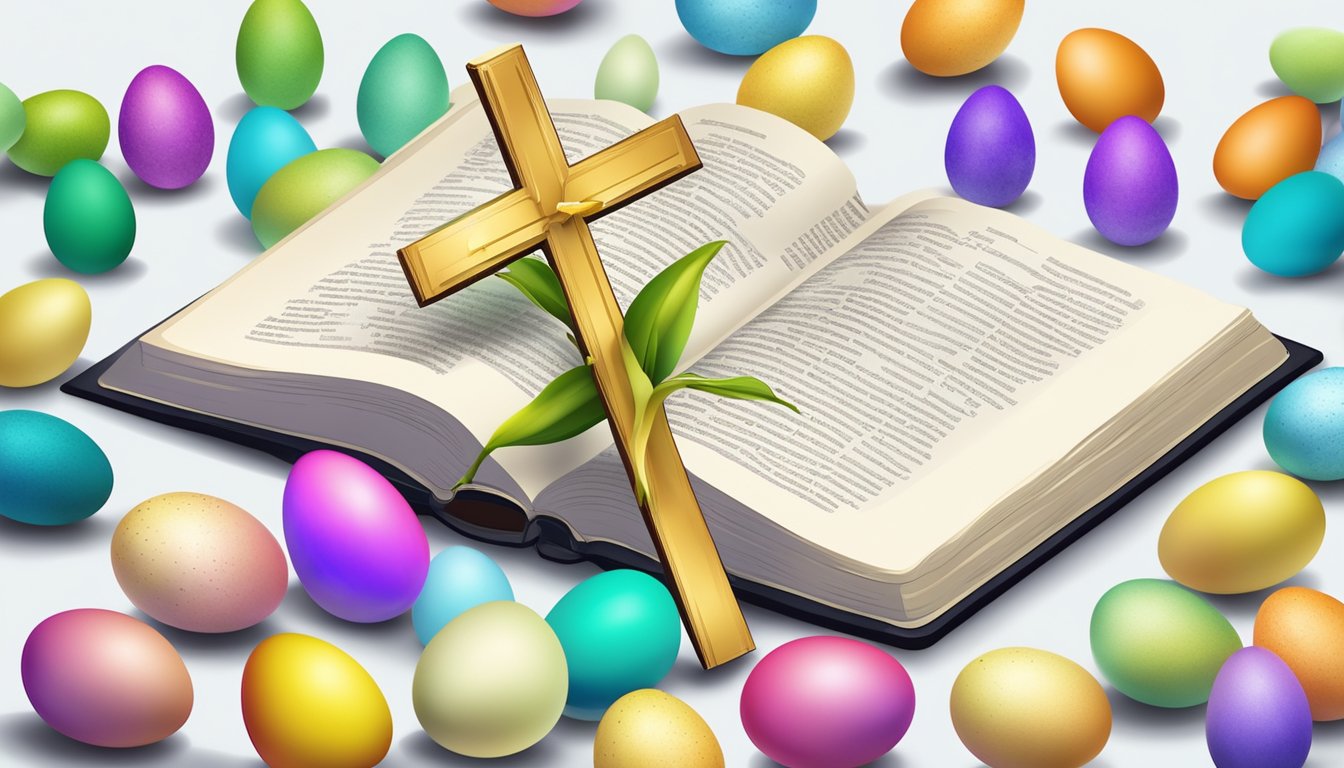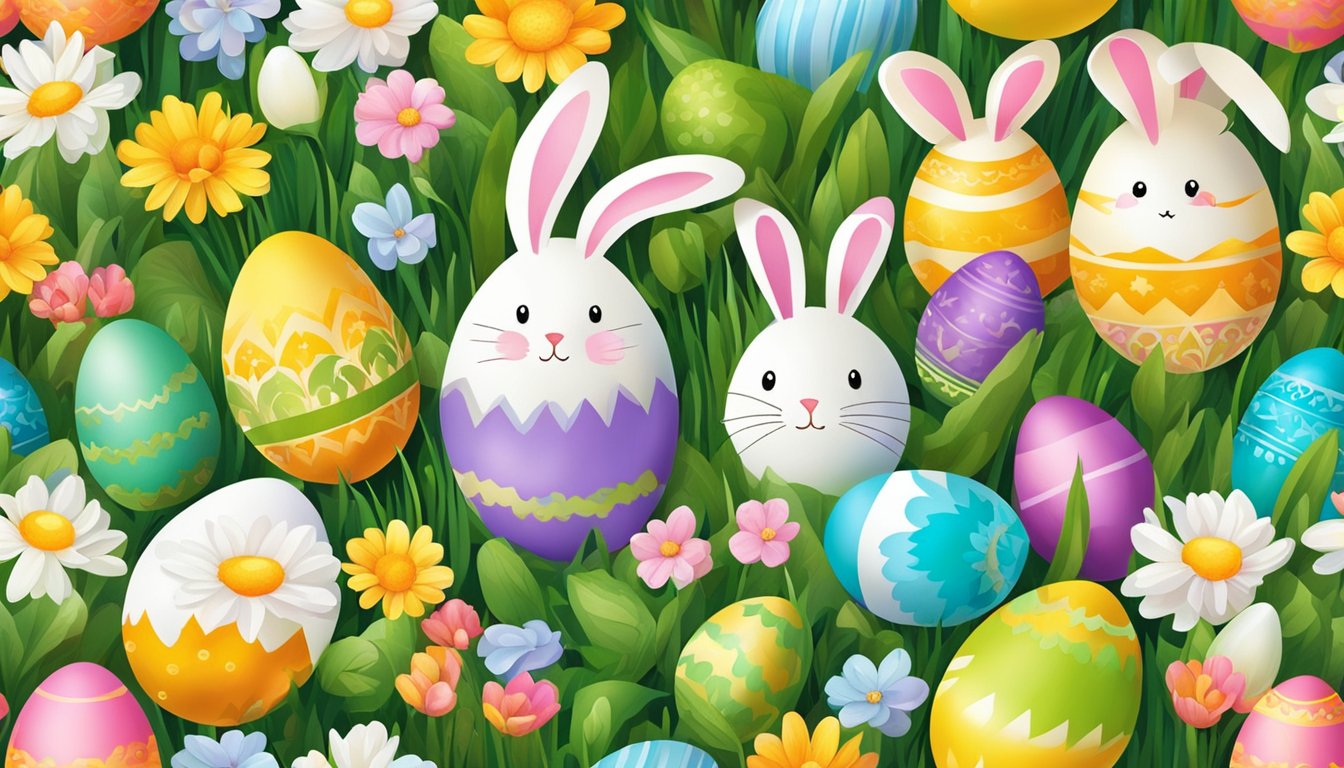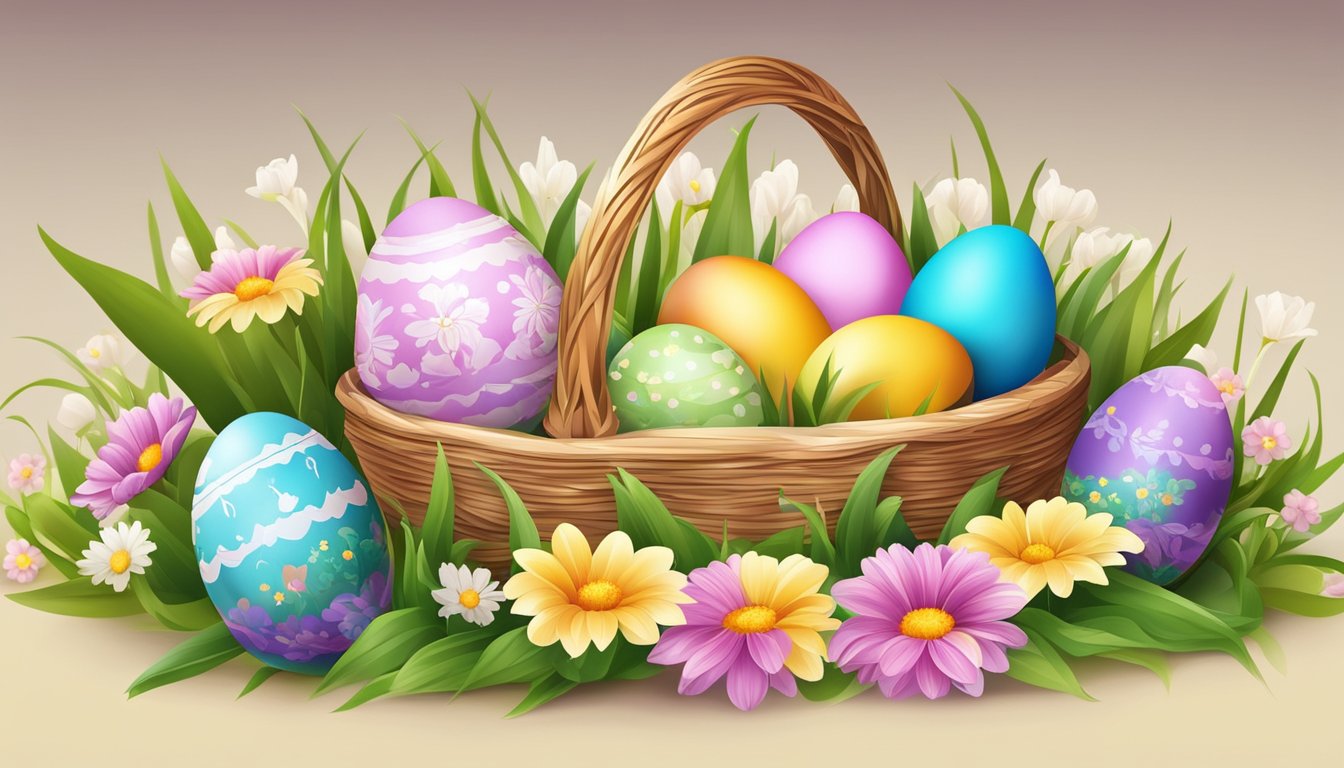Easter is a widely celebrated holiday around the world, but its origins and significance are often misunderstood. Many people associate Easter with Christianity, but some argue that it has pagan roots. So, is Easter a Christian holiday? The answer is yes, but with some caveats.

Easter is the most important holiday in the Christian calendar, marking the resurrection of Jesus Christ from the dead. It is celebrated on the first Sunday after the first full moon following the vernal equinox, which usually falls between March 22 and April 25. However, the timing of Easter has been a subject of controversy and debate throughout history, with different Christian denominations and cultures observing it on different dates.
Key Takeaways
- Easter is a Christian holiday that celebrates the resurrection of Jesus Christ from the dead.
- The timing of Easter is based on the lunar calendar and varies between different Christian denominations and cultures.
- Despite its Christian roots, Easter has some pagan influences and traditions that have been incorporated into its celebration over time.
The Significance of Easter in Christianity
https://www.youtube.com/watch?v=O8vsGMO5RgE&embed=true

Easter is a significant holiday in the Christian faith, commemorating the resurrection of Jesus Christ. It is one of the oldest and most important Christian festivals, celebrated by millions of Christians worldwide.
Resurrection of Jesus Christ
According to Christian scripture, Jesus Christ was crucified and buried in a tomb. On the third day, he rose from the dead, a miraculous event that is celebrated on Easter Sunday. The resurrection of Jesus Christ is a central tenet of the Christian faith, and it is believed that through his death and resurrection, he atoned for the sins of humanity and provided a path to eternal life.
Easter as a Christian Festival
Easter is celebrated on the first Sunday following the first full moon after the vernal equinox, which usually falls between March 22 and April 25. The holiday is preceded by the season of Lent, a time of fasting, prayer, and repentance. The week leading up to Easter Sunday is known as Holy Week and includes Palm Sunday, Maundy Thursday, and Good Friday.
Easter is celebrated in different ways by different Christian denominations. In the Catholic Church, for example, the Easter Vigil is held on the evening before Easter Sunday, and it includes the lighting of the Paschal candle, the singing of the Exsultet, and the baptism of new converts. In the Eastern Orthodox Church, Easter is celebrated on a different date, and it includes the lighting of candles, the singing of hymns, and the sharing of a special Easter bread called kulich.
Overall, Easter is a time of joy and celebration in the Christian faith, marking the resurrection of Jesus Christ and the promise of eternal life for all believers.
Historical Roots of Easter
https://www.youtube.com/watch?v=UkqsGnSZZwk&embed=true
Easter is a Christian holiday that celebrates the resurrection of Jesus Christ. However, the holiday has historical roots that predate Christianity.
Biblical Passover and Easter
The origins of Easter can be traced back to the Jewish holiday of Passover. According to the New Testament, Jesus was crucified during the Jewish holiday of Passover. Passover commemorates the Israelites’ liberation from slavery in Egypt. It is celebrated on the 15th day of the Jewish month of Nisan, which falls in March or April.
The Last Supper, which was Jesus’ final meal with his disciples before his crucifixion, is believed to have been a Passover Seder. During the Last Supper, Jesus broke bread and drank wine with his disciples, which is now known as the Eucharist in Christianity.
After Jesus’ death and resurrection, his followers continued to celebrate the Eucharist in memory of him. Eventually, the celebration of the Eucharist became known as Easter.
Easter in Early Christianity

The early Christian church celebrated Easter as a commemoration of Jesus’ resurrection. The date of Easter was originally based on the Jewish calendar and was celebrated on the first Sunday after the first full moon following the vernal equinox.
In the 4th century, the Council of Nicaea established a standard date for Easter throughout the Christian world. Easter is now celebrated on the first Sunday following the first full moon after the vernal equinox, which can fall between March 22 and April 25.
Despite its Christian origins, Easter has been influenced by pagan traditions over the years. The Easter bunny and Easter eggs, for example, are believed to have originated from pagan fertility symbols.
In conclusion, Easter has historical roots in both Judaism and Christianity. While it is now primarily a Christian holiday, it has been influenced by pagan traditions as well.
Easter Traditions and Symbols
https://www.youtube.com/watch?v=xZEhUAQftRs&embed=true
Easter is one of the most important Christian holidays, celebrating the resurrection of Jesus Christ. It is celebrated on the first Sunday following the first full moon after the vernal equinox. Easter is a time for family gatherings, church services, and traditional foods.
Easter Eggs and the Easter Bunny
« Is U2 a Christian Band? Exploring the Religious Themes in Their Music
Is Lebanon a Christian Country? Exploring the Religious Diversity of Lebanon »
Easter eggs are a symbol of new life and rebirth, and they have been associated with Easter for centuries. In many cultures, eggs were dyed and decorated to celebrate the arrival of spring. Today, Easter eggs are often made of chocolate and are given as gifts or hidden for children to find.
The Easter Bunny is another popular symbol of Easter. Legend has it that the Easter Bunny brings baskets of eggs and treats to children on Easter morning. The tradition of the Easter Bunny may have originated with German immigrants who settled in Pennsylvania in the 1700s.
Lent and Holy Week Observances
Lent is a period of fasting and spiritual reflection that lasts for 40 days leading up to Easter. During Lent, Christians give up certain luxuries or pleasures as a form of sacrifice and penance. This is meant to help them focus on their faith and prepare for the celebration of Easter.
Holy Week is the week leading up to Easter, and it includes several important observances. Palm Sunday commemorates Jesus’ triumphal entry into Jerusalem, when crowds waved palm branches to greet him. Maundy Thursday commemorates the Last Supper, when Jesus shared a final meal with his disciples. Good Friday commemorates Jesus’ crucifixion and death, while Easter Sunday celebrates his resurrection.

Overall, Easter is a time for reflection, renewal, and celebration. Whether you celebrate with traditional foods, Easter eggs, or church services, the holiday is a reminder of the hope and joy that comes with new beginnings.
The Timing of Easter
https://www.youtube.com/watch?v=EmtyYqq11Qc&embed=true
Easter is a Christian holiday that celebrates the resurrection of Jesus Christ. It is observed on the first Sunday after the first full moon following the vernal equinox. The date of Easter varies each year, but it usually falls between March 22 and April 25.
Calculating the Date of Easter
The date of Easter is calculated based on a combination of the Gregorian calendar and the lunar cycle. The Gregorian calendar is a solar calendar, which means that it is based on the Earth’s rotation around the sun. The lunar cycle, on the other hand, is based on the moon’s orbit around the Earth.
To calculate the date of Easter, the following steps are taken:
- Determine the date of the vernal equinox, which is usually March 21.
- Calculate the full moon that occurs on or after March 21.
- Easter is observed on the first Sunday after that full moon.
Differences in Eastern and Western Christianity

There are some differences in how the date of Easter is calculated in Eastern and Western Christianity. The Western Church uses the Gregorian calendar, while the Eastern Church uses the Julian calendar. As a result, the date of Easter in the Eastern Church usually falls later than in the Western Church.
In addition, the Eastern Church also uses a different method to calculate the date of Easter. Instead of using the first full moon following the vernal equinox, the Eastern Church uses the first full moon following the spring equinox, which is fixed at March 21 in the Julian calendar.
Overall, the date of Easter is calculated differently in different parts of the world, but it is always observed as a celebration of the resurrection of Jesus Christ.
Easter Around the World
https://www.youtube.com/watch?v=J6TOypl34yI&embed=true
Easter is a Christian holiday celebrated around the world, but the way it is celebrated varies from country to country. In this section, we will explore some of the different Easter customs and traditions in different parts of the world.
Western Easter Celebrations

In Western Christianity, Easter is celebrated on the first Sunday after the first full moon following the vernal equinox. The holiday is preceded by Lent, a period of 40 days of fasting, prayer, and penance. On Easter Sunday, Christians celebrate the resurrection of Jesus Christ.
In many Western countries, Easter is celebrated with church services, family gatherings, and the exchange of Easter eggs and other gifts. In the United States, children often participate in Easter egg hunts, where they search for hidden eggs filled with candy or small toys. Easter baskets filled with treats are also a popular tradition.
Orthodox Easter Customs
In Eastern Orthodox churches, Easter is celebrated on a different date than in Western Christianity. Orthodox Easter falls on the first Sunday after the first full moon following the vernal equinox, but it is calculated using the Julian calendar rather than the Gregorian calendar. As a result, Orthodox Easter is usually celebrated later than Western Easter.
Orthodox Easter customs vary depending on the country and region. In Greece, for example, it is customary to dye eggs red to symbolize the blood of Christ. In Russia, Easter is celebrated with special foods such as kulich, a sweet bread, and paskha, a type of cheesecake. In many Orthodox countries, it is also common to attend church services and participate in parades and other public celebrations.
Overall, Easter is a holiday with deep religious significance for Christians around the world. Whether celebrated in the Western or Orthodox tradition, the holiday is a time for reflection, prayer, and spending time with loved ones.
Theological Aspects of Easter

https://www.youtube.com/watch?v=3bZOxmFk0LQ&embed=true
Sin and Redemption
At the heart of the Christian faith is the idea that humans are inherently sinful and separated from God. According to Christian belief, sin entered the world through the disobedience of Adam and Eve in the Garden of Eden. Since then, all humans have been born with a sinful nature and are in need of redemption.
Easter commemorates the ultimate act of redemption: the sacrifice of Jesus Christ on the cross. According to Christian teaching, Jesus willingly gave his life as a sacrifice for the sins of humanity. Through his death and resurrection, believers are reconciled with God and granted eternal life.
Easter and the Christian Belief in Eternal Life
The resurrection of Jesus Christ is central to the Christian belief in eternal life. According to Christian teaching, Jesus was raised from the dead on the third day after his crucifixion. This event is celebrated on Easter Sunday.
For Christians, the resurrection of Jesus is a sign of hope and a promise of eternal life. Believers look forward to the day when they will join Jesus in heaven and be reunited with loved ones who have died.

Prayer is an important part of the Christian faith and is often used as a way to connect with God and seek guidance. Many Christians use prayer as a way to express their gratitude for the sacrifice of Jesus and ask for forgiveness for their sins.
Overall, Easter is a time for Christians to reflect on the sacrifice of Jesus Christ and the promise of eternal life. It is a reminder that, despite the trials and tribulations of life, there is hope for a better future.
Comparative Perspectives on Easter
Easter and Other Religious Traditions
Easter is a Christian holiday that celebrates the resurrection of Jesus Christ. However, many other religions also celebrate the arrival of spring and the renewal of life during this time of year. For example, Jewish Passover is a holiday that commemorates the liberation of the Israelites from slavery in Egypt. It is celebrated around the same time as Easter and also involves the themes of rebirth and renewal.
Pagan Influences on Easter
Easter also has pagan influences. The name “Easter” is believed to have been derived from the ancient Germanic goddess Eostre, who was associated with spring and fertility. Many of the symbols associated with Easter, such as eggs and rabbits, also have pagan origins. Eggs were a symbol of fertility in many ancient cultures, while rabbits were associated with the goddess Eostre.

Despite these pagan influences, Easter has become an important Christian holiday that celebrates the resurrection of Jesus Christ. It is celebrated by Christians all over the world and is a time for reflection, prayer, and family gatherings. While the holiday has evolved over time and has been influenced by many different cultures and traditions, its core meaning remains the same: the celebration of new life and hope.
Cultural Impact of Easter
Easter is not only a significant religious holiday but also a cultural phenomenon that has influenced art, literature, and popular culture. This section explores how Easter has impacted various aspects of culture.
Easter in Art and Literature
Easter has been a popular theme in art and literature for centuries. Many famous paintings depict the Crucifixion and Resurrection of Jesus Christ, such as “The Last Supper” by Leonardo da Vinci and “The Resurrection” by Piero della Francesca. In literature, the Easter story has been retold in many forms, including poetry, novels, and plays. For example, Oscar Wilde’s play “Salome” portrays the Crucifixion of Jesus Christ and the events leading up to it.
Easter’s Role in Popular Culture
Easter has also played a significant role in popular culture. The Easter Bunny and Easter eggs are two of the most recognizable symbols of the holiday. The Easter Bunny is said to bring baskets of eggs and candy to children on Easter Sunday, while Easter eggs represent new life and rebirth. Many movies and TV shows feature Easter themes, such as “It’s the Easter Beagle, Charlie Brown” and “Hop.” Additionally, many businesses use Easter as a marketing opportunity, offering special promotions and sales.

In conclusion, Easter has had a significant cultural impact beyond its religious significance. It has inspired artists and writers throughout history and has become a beloved holiday celebrated by people of all ages and backgrounds.
Easter Foods and Feasting
https://www.youtube.com/watch?v=ByGnp-ie7zk&embed=true
Easter is a time of feasting and celebration for many Christians around the world. While the specific foods and traditions vary from region to region, there are some common themes that tie them all together. In this section, we will explore some of the traditional Easter meals and the role that fasting and feasting play during this important holiday.
Traditional Easter Meals
One of the most popular Easter meals is roasted lamb. This tradition dates back to the Jewish holiday of Passover, which commemorates the Israelites’ liberation from slavery in Egypt. According to tradition, the lamb was sacrificed and roasted as part of the Passover feast. Christians adopted this tradition and began serving roasted lamb as part of their Easter meal, symbolizing the sacrifice of Jesus Christ on the cross.
In addition to lamb, many cultures have their own unique Easter dishes. In Greece, for example, it is traditional to serve tsoureki, a sweet bread made with orange zest and spices. In Italy, Easter is celebrated with a feast of antipasti, pasta, and roasted meats. In the United States, ham is a popular Easter dish, often served with scalloped potatoes and green beans.
Fasting and Feasting in Easter

While feasting is an important part of Easter, many Christians also observe a period of fasting leading up to the holiday. This period is known as Lent and lasts for 40 days, beginning on Ash Wednesday and ending on Maundy Thursday. During this time, Christians may give up certain foods or habits as a form of sacrifice and penance.
On the other hand, Easter Sunday is a time for feasting and celebration. Many Christians break their fast with a special meal, often featuring the traditional Easter foods mentioned above. In some cultures, Easter Monday is also celebrated as a day of feasting and relaxation.
In conclusion, Easter is a time of both fasting and feasting, with traditional meals and dishes varying depending on the culture and region. Whether it’s roasted lamb, sweet bread, or ham and potatoes, the food served during Easter is a symbol of the sacrifice and resurrection of Jesus Christ.
Easter and Social Practices
Easter is not only a religious holiday but also a social one. It is a time when families and communities come together to celebrate and participate in various activities. In this section, we will explore the social practices associated with Easter.
Community and Family Celebrations
Easter is a time when communities and families come together to celebrate the holiday. Churches often hold special services and events, such as Easter egg hunts and community meals. These events are a great way for people to come together and celebrate the holiday.
Families also have their own traditions and celebrations. Many families dye and decorate Easter eggs, which are then hidden for children to find. Easter baskets filled with candy and small gifts are also a common tradition. Some families also have special meals, such as ham or lamb, on Easter Sunday.
Easter as a Public Holiday
Easter is a public holiday in many countries, which means that businesses and schools are closed. This allows families to spend time together and participate in Easter activities. In addition to the religious celebrations, there are also many secular traditions associated with Easter.
For example, Easter is often associated with the Easter Bunny, who brings baskets filled with candy and gifts for children. Easter parades and festivals are also common, with people dressing up in colorful costumes and participating in games and activities.
Overall, Easter is a time for families and communities to come together and celebrate. Whether through religious services or secular traditions, Easter is a holiday that is enjoyed by many.
The Future of Easter Celebrations
Modern Interpretations of Easter
As society evolves, so do the ways in which holidays are celebrated. Easter is no exception. While the religious significance of Easter remains important to many Christians, the holiday has taken on a more secular meaning in modern times. Many people now associate Easter with the Easter bunny, egg hunts, and other non-religious traditions.
In addition to the secularization of Easter, there has also been a rise in multicultural celebrations of the holiday. For example, in some areas, Easter is celebrated with traditional African dances and music. These celebrations reflect the changing demographics of many communities and the desire to incorporate diverse cultural traditions into holiday celebrations.
Easter in a Changing World
As the world changes, so too will the way in which Easter is celebrated. Climate change, globalization, and advances in technology are just a few of the factors that will impact the future of Easter celebrations.
One potential adaptation to these changes is the increased use of virtual and augmented reality technology. This could allow people to participate in Easter celebrations from anywhere in the world, regardless of physical location. Another possibility is the incorporation of sustainable practices into Easter celebrations, such as using eco-friendly materials for Easter baskets and decorations.
Overall, the future of Easter celebrations is likely to reflect the changing needs and desires of society. While the religious significance of the holiday will remain important to many, there will also be a continued focus on secular and multicultural traditions, as well as a growing awareness of the need to adapt to a changing world.
Frequently Asked Questions
https://www.youtube.com/watch?v=DiK9k4NLteA&embed=true
What does Easter commemorate in Christian tradition?
Easter is a Christian holiday that commemorates the resurrection of Jesus Christ from the dead. According to Christian tradition, Jesus was crucified on Good Friday and rose from the dead on Easter Sunday. This event is considered the cornerstone of Christian faith and is celebrated by Christians worldwide.
How do Christians around the globe observe Easter?
Christians around the world observe Easter in different ways. Some attend church services, while others participate in Easter egg hunts or other activities. In many countries, Easter is a public holiday, and businesses and schools are closed. Some Christians fast or give up certain foods or activities during the period leading up to Easter, known as Lent.
Can you explain the spiritual significance of Easter?
The spiritual significance of Easter lies in the belief that Jesus Christ died for the sins of humanity and rose from the dead, offering the promise of eternal life to all who believe in him. Easter is a time of renewal and hope, and it reminds Christians of the power of God’s love and the promise of salvation.
What are some key traditions associated with the Easter celebration?
Easter is associated with a number of traditions, including the Easter bunny, Easter eggs, and hot cross buns. The Easter bunny is a symbol of fertility and new life, while Easter eggs represent new life and rebirth. Hot cross buns are a traditional Easter food that is said to have originated in England.
Is there a connection between Easter and other non-Christian spring festivals?
There is some evidence to suggest that Easter may have been influenced by non-Christian spring festivals, such as the pagan festival of Ostara. However, the exact origins of Easter are unclear, and many of the traditions associated with the holiday have been adapted over time.
Why is Easter considered a pivotal event in Christianity?
Easter is considered a pivotal event in Christianity because it represents the fulfillment of God’s promise to send a savior to redeem humanity. The resurrection of Jesus Christ is seen as the ultimate victory over sin and death, and it offers hope to all who believe in him. Without Easter, Christianity would not exist as we know it today.















